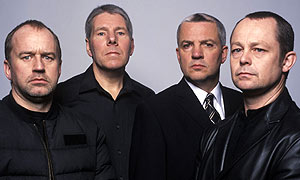The Interrogators
(→Broadcast) |
(→Synopsis) |
||
| (2 intermediate revisions not shown) | |||
| Line 10: | Line 10: | ||
== Broadcast == | == Broadcast == | ||
| - | BBC | + | BBC Three, 7 to 21 June 2004 (3 episodes in 1 series) |
</div> | </div> | ||
| Line 18: | Line 18: | ||
Very different game show where two contestants are given a suitcase containing £10,000 of your BBC Licence Fee money and hide it in one of the pre-determined locations on offer which they visit beforehand. | Very different game show where two contestants are given a suitcase containing £10,000 of your BBC Licence Fee money and hide it in one of the pre-determined locations on offer which they visit beforehand. | ||
| - | After that, they are voluntarily bundled into the police cells and introduced to the Interrogators. Their task is to break the contestants and find the location of the money within 8 hours. After this time, the Interrogators make their guess and drive to where they think the money is. Shortly afterwards, the contestants are released to see if they've been rumbled and find their empty suitcase empty, or whether in fact they've got away with the dosh of about 95 licence fee payers. | + | After that, they are voluntarily bundled into the police cells and introduced to the Interrogators. They consist of two military interrogators, a police officer and a former prison governor. Their task is to break the contestants and find the location of the money within 8 hours. After this time, the Interrogators make their guess and drive to where they think the money is. Shortly afterwards, the contestants are released to see if they've been rumbled and find their empty suitcase empty, or whether in fact they've got away with the dosh of about 95 licence fee payers. |
There is an unwritten conceit - which is perhaps where the show falls down - in that the contestants must, it seems, give a fair answer to a fair question. They can lie all they like, but they can't clam up completely. Therefore, it's more about keeping your story straight and avoiding the possibility of getting caught up in the crossfire of what your partner in crime is saying in the other room. | There is an unwritten conceit - which is perhaps where the show falls down - in that the contestants must, it seems, give a fair answer to a fair question. They can lie all they like, but they can't clam up completely. Therefore, it's more about keeping your story straight and avoiding the possibility of getting caught up in the crossfire of what your partner in crime is saying in the other room. | ||
Current revision as of 12:26, 22 November 2017
Contents |
Host
Co-hosts
Blue Cole, Nobby Clark, John "Badger" Cook, Dave Wickham
Broadcast
BBC Three, 7 to 21 June 2004 (3 episodes in 1 series)
Synopsis
Very different game show where two contestants are given a suitcase containing £10,000 of your BBC Licence Fee money and hide it in one of the pre-determined locations on offer which they visit beforehand.
After that, they are voluntarily bundled into the police cells and introduced to the Interrogators. They consist of two military interrogators, a police officer and a former prison governor. Their task is to break the contestants and find the location of the money within 8 hours. After this time, the Interrogators make their guess and drive to where they think the money is. Shortly afterwards, the contestants are released to see if they've been rumbled and find their empty suitcase empty, or whether in fact they've got away with the dosh of about 95 licence fee payers.
There is an unwritten conceit - which is perhaps where the show falls down - in that the contestants must, it seems, give a fair answer to a fair question. They can lie all they like, but they can't clam up completely. Therefore, it's more about keeping your story straight and avoiding the possibility of getting caught up in the crossfire of what your partner in crime is saying in the other room.
The contestants could be rather cunning, with some of them "accidentally" making mistakes that were in fact completely intentional. While the team usually had up to 10 locations to search out, they could normally narrow it down to 3 fairly easily, so the ending was usually very tense. One thing that spoiled it was the use of clues, which was a producer cheat in our eyes, and voice stress analysis - which never seemed to work anyhow.
Consumer journo Paul Kenyon didn't seem to be the right person for this - either you needed an Adrian Chiles to jolly it along as light relief from the grit, or you needed a Phil Mitchell type to talk the same language as the fuzz.
An interesting experiment but its flaws probably restricted it to the one series it got.


